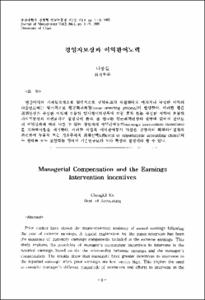Wordsworth의 言語觀
- Alternative Title
- Wordsworth's View of Poetic Language
- Abstract
- Wordsworth의 시론에서 가장 논란의 대상이 되고 있는 것은 그의 언어이론이다. 그 이유는 이론 자체의 불합리성과 이론과 실제의 모순에 있었다. 그러나 그의 이론을 좀더 면밀히 검토하고 동일한 주제에 고나한 여러가지 진술을 종합하는 동시에 실제 작품과 서로 비교해 보면 표면적인 모순의 이면에 시인의 일관된 생각이 지속되고 있음을 알게 된다. 본 논문은 그가 언어이론에서 일관되게 주장하는 것이 무엇인가를 밝히는데 그 목적이 있다.
Wordsworth의 언어관을 밝히기 위해서 "Preface"(1800-2)를 중심으로 한 산문으로 된 시론과 The Prelude의 언어이론을 비교하여 그가 추구하는 것이 무엇인가 알아 보았다. 그는 시의 본질인 감정을 전달할 수 있는 매체로서 구체적 사물의 심상에 관심을 갖고 있다. "PReface"에서 "사회 중하류층의 생활어" 또는 소박한 시골사람들의 언어를 시어로 사용한다는 주장을 한 것과, "The Thorn"의 주에서 "事物로서의 言語"라는 표현을 사용한것, 그리고 "Essay upon Epitaphs"와 "化身"의 비유와 The prelude의 "투명한 베일"의 비유는 모두 언어의 구체성에 대한 관심을 표명한 것이다. 이러한 언어의 구체성에 대한 관심은 현대시의 이미지론이나 Eliot의 "객관적 상관물"이론과 유사하다.
Nobody can be a great poet without mastery of his medium. Wordsworth was one of the most conscious artists in the history of the English literature. The most controversial part of his theory of poetry was that which was concerned with the contradictions in his prose essays and the discrepancy between his theory of poetic language and his theory of poetic language and his practice. However, a consistent view of poetic language underlies the apparent contradictions in his theory and practice. This essay is an attempt to explicate this underlying consistency. In so doing, his prefaces and essays in prose will be compared with those passages of The Prelude which are concerned with his view of poetic language.
Wordsworth's main concern in his theory of poetic language is how to find out the effective means of communicating objectively his subjective emotions which he thinks are the essence of poetry. He thinks that a poet should be able to use language in such a way that it can present things in their thingness. And in practice he uses words which denote concrete things which are universally intelligible: these things are employed as images, which in his poetry are usually copies of external objects. His interest in the physicality of poetic language is consistently revealed in such expressions as the "language of conversation in the middle and lower classes of society" and the language of "low and rustic people" and "the real language of men in a state of vivid sensation"; it is also revealed in his view of "words as things"(Note to "The Thorn") of language as "incarnation of thought"("Essay upon Epitaphs") or "transparent veil" (The Prelude Bk. V), Such a view of poetic language has much in common with that of the Imagists and with Eliot's concept of "objective correlative."
Nobody can be a great poet without mastery of his medium. Wordsworth was one of the most conscious artists in the history of the English literature. The most controversial part of his theory of poetry was that which was concerned with the contradictions in his prose essays and the discrepancy between his theory of poetic language and his theory of poetic language and his practice. However, a consistent view of poetic language underlies the apparent contradictions in his theory and practice. This essay is an attempt to explicate this underlying consistency. In so doing, his prefaces and essays in prose will be compared with those passages of The Prelude which are concerned with his view of poetic language.
Wordsworth's main concern in his theory of poetic language is how to find out the effective means of communicating objectively his subjective emotions which he thinks are the essence of poetry. He thinks that a poet should be able to use language in such a way that it can present things in their thingness. And in practice he uses words which denote concrete things which are universally intelligible: these things are employed as images, which in his poetry are usually copies of external objects. His interest in the physicality of poetic language is consistently revealed in such expressions as the "language of conversation in the middle and lower classes of society" and the language of "low and rustic people" and "the real language of men in a state of vivid sensation"; it is also revealed in his view of "words as things"(Note to "The Thorn") of language as "incarnation of thought"("Essay upon Epitaphs") or "transparent veil" (The Prelude Bk. V), Such a view of poetic language has much in common with that of the Imagists and with Eliot's concept of "objective correlative."
- Issued Date
- 1986
- Type
- Research Laboratory
- Alternative Author(s)
- Park, Pyung-Hui
- Publisher
- 연구논문집
- Language
- kor
- Rights
- 울산대학교 저작물은 저작권에 의해 보호받습니다.
- Citation Volume
- 17
- Citation Number
- 2
- Citation Start Page
- 153
- Citation End Page
- 183
- Appears in Collections:
- Research Laboratory > University of Ulsan Report
- 파일 목록
-
-
Download
 000002023840.pdf
기타 데이터 / 373.45 kB / Adobe PDF
000002023840.pdf
기타 데이터 / 373.45 kB / Adobe PDF
-
Items in Repository are protected by copyright, with all rights reserved, unless otherwise indicated.